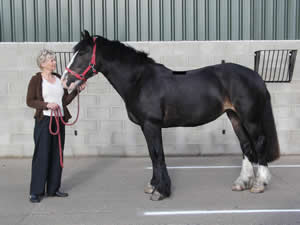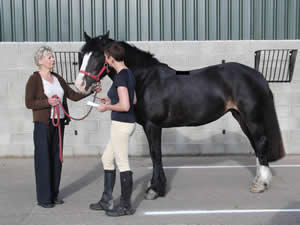The Therapy Session Process
The therapy process involves the following steps -
Clients will receive a report sheet of the therapy session which will include aftercare advice.
- Permission must be obtained from the relevant veterinary practice, prior to any therapy taking place, as detailed by the Veterinary Surgeons Act 1966
- Taking a detailed case history of you, the client, together with your horse or dog and the work or play that you share together.
- Making an initial assessment of your horse or dog whilst standing and also in motion.
- Therapy session according to findings
- Aftercare advice and session feedback
Clients will receive a report sheet of the therapy session which will include aftercare advice.
|
The Importance of Case History
Gaining an overall understanding of your animals and the activities you do together are an important part of the holistic treatment process, because this gives insight into the factors that may be contributing to musculo-skeletal imbalances and changes in behaviour and performance. |
Veterinary Surgeons Act 1966
Under this act it is imperative that ONLY qualified therapists should complete therapy sessions on other people's animals and that ALL qualified therapists should seek confirmation from the relevant veterinary practice prior to performing therapy on an animal. In addition therapists should not legally make a diagnosis but can give a professional opinion.
The Veterinary Act of 1966 was put in place to regulate the treatment of animals. Under its provisions it is only veterinary surgeons who may legally diagnose, prescribe and advise on the basis of a diagnosis and perform surgery on animals.
The Veterinary Exemptions Order of 2015 states that:
Section 19(1) of the 1966 Act does not prohibit the treatment of an animal by physiotherapy if the following conditions
are satisfied.
(b)has prescribed the treatment of the animal by physiotherapy.
Under this act it is imperative that ONLY qualified therapists should complete therapy sessions on other people's animals and that ALL qualified therapists should seek confirmation from the relevant veterinary practice prior to performing therapy on an animal. In addition therapists should not legally make a diagnosis but can give a professional opinion.
The Veterinary Act of 1966 was put in place to regulate the treatment of animals. Under its provisions it is only veterinary surgeons who may legally diagnose, prescribe and advise on the basis of a diagnosis and perform surgery on animals.
The Veterinary Exemptions Order of 2015 states that:
Section 19(1) of the 1966 Act does not prohibit the treatment of an animal by physiotherapy if the following conditions
are satisfied.
- The first condition is that the person providing the treatment is aged 18 or over.
- The second condition is that the person is acting under the direction of a qualified person who--
(b)has prescribed the treatment of the animal by physiotherapy.


